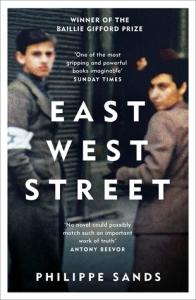 image: goodreads.com
image: goodreads.com This is a book about many things. Ostensibly you could say that East West Street is about a lawyer and historian, Phillippe Sands, exploring the lives of his maternal grandparents (and his mother) before and during the Second World War. It starts as that, catalysed by Sands being invited to give a lecture at the University of Lviv and this spurring him on to explore the life of his grandfather Leon Buchholz, who was born in Lviv (which is now in Ukraine, but was part of Poland before the war). That's one side of the book. The other is about two men, both of whom studied at the University of Lviv, who invented the concepts of Genocide and Crimes Against Humanity as we know them today - both as products of the Second World War. And yet there is one more central character in this story, one man with huge influence over the lives of the other three men in this book, and in turn over the author - the Governor-General of Occupied Poland, Hans Frank.
So there's a lot going on. But for me I did not feel overwhelmed by the volume of content, or the intertwining of four stories - five if you count Sands' own personal experience. Indeed I found his own story to be an anchor for the others, a perfect frame for the flow of historical information and discovery. Sands relates many stories from information he has looked for, discovered, and explored firsthand. He wrote the book over several years and several research trips ranging from the US and the UK, to the key locations in mainland Europe throughout France, Germany, Poland, and Ukraine. This is a book about some of the most momentous events before, during, and after the Second World War, but underneath it is the very personal story of Sands' own family. It is sobering to be reminded throughout East West Street just how close these events are to our present life, when you remember that Sands' mother is the young girl being spirited out of Vienna in 1939. It seems so long ago, and at the same time so recent.
Phillippe Sands' knowledge and experience as a lawyer mean that he is detailed, methodical, and wonderfully analytical as he recounts what he has discovered. I loved reading about his research journey, how the limited personal knowledge and the chance encounter with Lviv leads him to archives, libraries, museums, and an incredible cast of characters (for better or worse). The personal side grounds the overarching story and adds a tangibility to the more abstract discussions of the concepts of Genocide and Crimes Against Humanity. Sands' recounts the circumstances of how Rafael Lemkin and Hersch Lauterpacht developed these two concepts, completely separate though aware of each other, and then how they both played a role in the Nuremberg trials in 1945 and 1946, and how they became enshrined in international law, and their lasting influence.
It is incredible to think that both men happened to study at the University of Lviv, even under some of the same teachers, and that they both managed to leave Poland in time to be safe, both leaving behind family members whose varied fates were a mystery until after the war ended. It is incredible that they developed these two legal concepts, similar and yet distinct, and how vital they were in the trials at the end of the war - trials that convicted Hans Frank. Frank ruled over the territories where their families lived, was directly or indirectly responsible for the suffering and death of those families. The fact that Lauterpacht, more successful and influential at the time with his concept of Crimes Against Humanity, was actually in the court as part of the British prosecution team while Hans Frank sat in the dock, is amazing. He knew that this man was responsible for whatever had happened to his family. This connection, and that of Sands and his family, perfectly demonstrates how this story, with its many sub-stories, is always personal and yet always public and part of a shared history.
It is tricky to talk about East West Street without just speaking in platitudes and superlatives, but it is a deeply significant and moving book that not only explores some of the most important events of that time, but also sensitively relates these things to the people and families that were there - and to their descendants. It is a wonderful mix of the significant, serious history, and the smaller, personal, family history. It is at once broad and wide-ranging, detailing the formation of modern international law and the changing identity and structure of Europe; and at the same time very specific - the story of one man and his journey to learning more about his family, more about his own history, more about his own mother. I think Phillippe Sands was the perfect person to the write this kind of book with the perfect mix of personal connections and professional perspectives. It is an intense and at times emotional reading experience, but if you have any interest in this period I highly recommend East West Street.
*
Originally published in 2106 by Alfred A. Knopf (USA) and Wiedenfeld & Nicolson (UK). I read the 2017 W&N paperback, pictured above.
